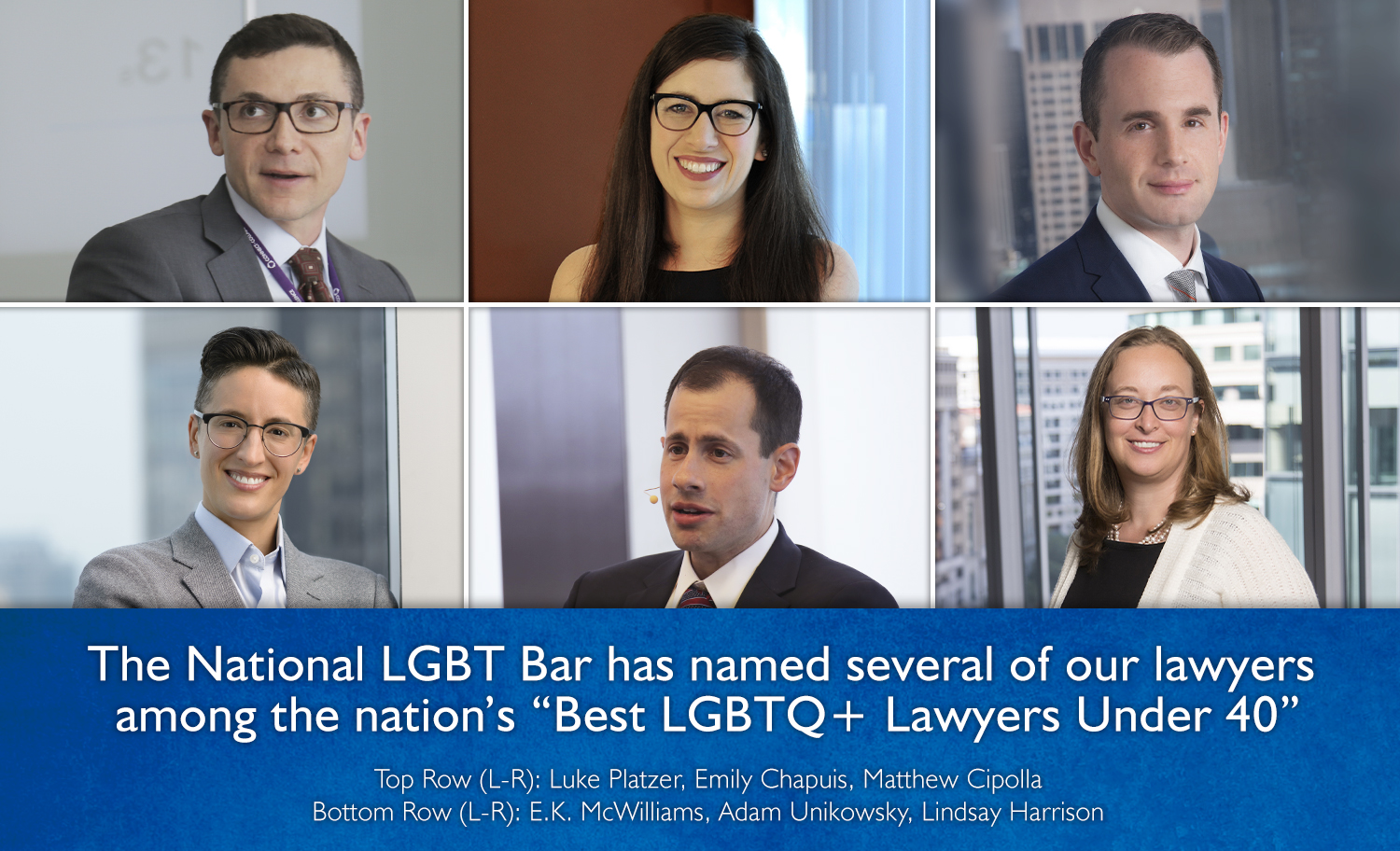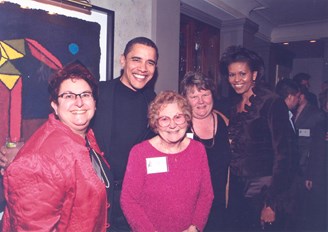
Jenner & Block has the highest number of LGBTQ associates in BigLaw. We caught up with them to learn why they've been so successful in tackling diversity.
IN BigLaw, diversity is a big concern. Every year many words are exchanged and dollars spent in the hope of making firms more representative of the American population, but only a handful of firms can show a good return. Jenner & Block is one such firm: with 12.6% of associates identifying as LGBTQ, the firm has the highest figure in the Am Law 100 and outranks the rest of BigLaw by some degree – the average in our guide is 3.8%. We interviewed a few LGBTQ lawyers and diversity leaders at the firm to find out why Jenner is getting results where others are not, and what impact it has on the whole firm.
Fighting the cause has been important for Jenner and has sent a strong message to the LGBTQ legal community. Litigation associate Andrew Sullivan commends the firm’s commitment to diversity and inclusion. He reflected that LGBTQ lawyers “don’t have to be the token LGBTQ person.” When LGBTQ lawyers don’t feel ‘token’, they feel respected for their LGBTQ status but not defined by it. As with other areas in D&I, achieving a kind of “critical mass,” as Partner (and one of the LGBTQ Bar’s Top LGBTQ Lawyers Under 40 award winner) Emily Chapuis puts it, makes a huge cultural impact; “It feels pretty terrific having so many people share and understand LGBTQ issues.”
To affinity and beyond
Attracting the numbers is one problem, but as we know from tracking the rates of women making partner in BigLaw, the culture must remain open all the way up the hierarchy. Affinity groups are one effective way of keeping up a dialogue, and Jenner, unsurprisingly, has “a very active LGBTQ affinity group.” Not only do they offer a ‘safe space’ for LGBTQ lawyers to “not worry about who you are,” but they’re also the vehicle for “pushing forward LGBTQ initiatives within the firm.” The group has “lots of conversations to make sure our internal policies match up to our firm values,” Chapuis tells us. “We hit all the check marks for inclusion, but we’re constantly trying to figure out ways to do more than that!”
Jenner’s LGBTQ affinity group houses within it a working group that is focused on trans inclusion. “Focusing on specific groups is a part of being inclusive,” says Courtney Carter, the director of diversity and inclusion. “We emphasize this by hosting a variety of events to help us move the needle.” One recent event led by the working group was a panel on transgender inclusion in the workplace. “We had two experts in the field,” including Jillian Wise, who works with the Transgender Legal Defense and Education Fund, and “our panelists discussed what they’re seeing in workplaces and some best practices.” The firm maximized the event’s impact by inviting local law students and broadcasting it live across the firm’s network. Chapuis tells us, “We need to share what we can all be doing in order to improve inclusion everywhere.”
Genderqueer pioneer
Jenner has been something of a trendsetter. “In terms of LGBTQ inclusion we have long been an industry leader. Jenner offered LGBTQ-inclusive benefits and policies before most other law firms did,” Chapuis explains. “Now those benefits and policies have become standard in many law firms!” But that doesn’t mean the battle for LGBTQ equality is over; “trans inclusion is an area we’re really trying to push and further establish Jenner & Block as an industry leader.”
Associate E.K. McWilliams is the first lawyer at the firm to come out as trans and use gender-neutral pronouns and titles. “Three years ago I came out as transgender – as genderqueer and on the trans spectrum,” they told us, “and the firm said from day one ‘what can we do support you?’ and ‘what can we do better?’”
“It is so powerful to have someone who is comfortable to be who they are.”
Including people of trans experience in the workplace means promoting specific initiatives, such as using an employee healthcare provider that covers any surgeries and medicine wanted by the individual for their transition, equal bathroom policies, and a standardized system for communicating names and pronouns internally. But listening is probably the best thing an employer can do, thinks McWilliams: “When I say there are resources I need on a personal level to be included, they trust me on that. There’s only one of me, but it’s not contingent on the number of trans people there are here: I work here, I’m a colleague – that’s enough for them to take it seriously.”
Transgender people still experience severe legal challenges in healthcare, immigration and legal gender recognition, as well as laws that impact daily life such as state-based ‘bathroom bills’ and exclusive insurance policies. Transgender lawyers bring a fresh perspective and help push the profession forward – Jenner is one firm acknowledging that. As Carter puts it, it’s an opportunity for leadership in the profession: “It is so powerful to have someone who is comfortable to be who they are. It’s one thing for me to say the firm lets people openly be who they are; it’s another to see someone live that out. E.K. is a role model and messenger – they are the best of us!”
Diversity: the business case
“We’ve known for a long time that diversity of all kinds makes our work better,” Chapuis tells us. “If you exclude people, implicitly or explicitly, for any reason – you’re not getting the best result you can get.”
Carter, an expert on the business case for diversity, reminds businesses that fostering inclusivity and diversity is “obviously the moral and right thing to do.” But for those that aren’t persuaded by moral duty, she implores that diversity “is also a business imperative! And there are hard facts and research that back that up.”
Data research and marketing specialists Out Now’s 2015 report LGBTQ Diversity: Show Me the Business Case claims that LGBTQ diversity in the workplace can improve team productivity by up to 30%. Reports on the other main focuses of diversity – women and ethnicity – produce equally persuasive figures. An increasing trend, for example, is being led by the clients who are becoming more demanding about the diversity on legal teams at the point of tender.
“I’m going to be successful in my life, I’m going to create this life for myself.”
A study from McKinsey & Company found that companies with diverse leadership generally performed better financially, and another from Deloitte concluded that more diverse companies were perceived to have a significant competitive advantage. The consensus is that diverse teams offer a greater variety of ways to tackle problems; more lived experience means more potential solutions to issues.
“We are people who have faced adversity,” says Andrew Sullivan, highlighting a trait LGBTQ people share with many from other diverse groups. “That background tends to make us fighters, strivers and hard-workers,” he adds. Drawing on his own life experience, Sullivan elaborates: “I don’t want to generalize – but for me, going through high school I faced a lot of not nice things. It forced me to say to myself: ‘you know what? I’m going to rise above this, I’m going to work hard, study hard and I’m going to be successful in my life, I’m going to create this life for myself.”
“When you face adversity, it propels you,” concludes Sullivan. This knowledge should be empowering to LGBTQ students: most standard OCI questions cover the generic ‘tell us about a time you overcame adversity’. This is the moment to draw on your personal experience, and explain why it would be an asset to the firm.
It's the little things
However inclusive a firm is, being a lawyer requires a lot of contact with people outside of the office. Sullivan tells us of the inescapable “implicit or explicit bias of a whole host of people who might not give you a fair shot as a lawyer because of who you are. When you think about going in front of a jury, you don’t know who's on the other side of the equation.”
Of course, if queerphobia presents itself and an LGBTQ individual feels uncomfortable or unsafe, firms dedicated to inclusion ought to remove the prejudiced party. However, when it comes to the silent implicit bias of a client, juror, opposing counsel or judge, it can be much harder to even detect a prejudice against LGBTQ lawyers. Small, almost undetectable prejudices can eat away at an LGBTQ individual’s career confidence.
“You’re never going to be able to do your job well if you’re not being authentic.”
Sullivan says if he’s in a situation where he feels the person on the other side might have a bias against LGBTQ individuals: “I forge ahead and do the best I can. At the end of the day, you’re never going to be able to do your job well if you’re not being authentic.” Though not an option available to everyone, doing your best work in the face of implicit bias shows the world that LGBTQ people will not stand down for others’ prejudices.
In the office, micro-discriminations can occur outside of direct homophobic and transphobic behavior, even in an organization that counts itself as LGBTQ inclusive. Lack of LGBTQ management, exclusive language and that indescribable vibe that you need to watch what you say can all lead LGBTQ people to feel they may have no future with an employer. McWilliams tells us: “If you’re out as LGBTQ for long enough, you learn to read signs of disapproval. You learn the sidelong glances, the phrases.” (Though they are quick add: “I’ve never gotten signals from my colleagues at Jenner & Block that my queerness is a disruption.”)
Such behavior hinders confidence and drive and so decreases business productivity too. In addition, lack of confidence could cost an LGBTQ individual that important place on a case or deal team, leading to a lower chance of promotion. This in turn leads to fewer LGBTQ people in positions of power at a law firm, which means fewer role models for those at the entry level.
On the cutting room floor
In a profession like law that relies heavily on interaction and rapport, being open and honest is key. Sullivan tells us: “If I was editing a conversation with a colleague or client to cut out the fact that I have a partner of 12 years and we just bought our first house or are planning on adopting, I’m not going to be authentic or connect.” Talking about family, friends or social activities is one of the most common ways to build rapport in a business meeting – everyone ought to be open to talking to LGBTQ people about all these things too. “People perceive barriers even if they’re unspoken,” says McWilliams.
“At Jenner & Block there’s no ‘do you have a husband/wife?’ – people will say ‘partner’.”
Firms can promote equality through promoting simple changes to phrasing: “At Jenner & Block there’s no ‘do you have a husband/wife?’ – people will say say ‘partner’,” McWilliams tells us. Trans and non-binary inclusion can be promoted through the avoidance of gendered formal greetings like ‘ladies and gentlemen’, and the inclusion of custom gender options rather than ‘male’ and ‘female’ on application and data tracking forms. “These are small things that really make a difference in people’s lives,” says Carter.
In addition, “a lot of it is about signalling,” McWilliams tells us. “At orientation for first-years this year, colleagues introduced themselves and gave their pronouns at the same time.” This is a signal that “in itself says ‘hey, we’re a trans friendly environment and there’s no stigma here’.”
Is it worth it? Let me work it
As an aspiring LGBTQ lawyer, there are also bigger policies to look into when you're choosing a firm: gender-neutral parental leave, adoption benefits, equal healthcare access, and future prospects.
Before you get to a firm, analyze if senior management are practicing what they preach in terms of wanting LGBTQ individuals to succeed at their firm. If a firm’s LGBTQ inclusive policies are relatively new then a lack of LGBTQ people at the top may be a historic pipeline issue. However, it’s not a bad idea to ask exactly what is in place to help you succeed and make your way to the top of the firm.
“I made it very clear that I was LGBTQ to any person I was speaking with.”
Carter suggests students “talk to other lawyers about diversity at the firm. Hearing personal experiences and advice from LGBTQ lawyers who have worked there is key.” However, Sullivan warns budding lawyers not to take advice from everyone as gospel: “I had an older lawyer tell me ‘you shouldn’t get into your personal life in your interviews.’ I know that his intentions were good, and he was trying to protect me based on his own experience as an LGBTQ lawyer – but I did not take that advice.”
In fact, Sullivan did the exact opposite, “I made it very clear that I was LGBTQ to any person I was speaking with. I knew if that was a reason that I was going to be treated negatively, I didn’t want to work there anyway!” For those that feel safe and confident doing so, being open and proud is a great way not only to let a firm get to know you better, but to really gauge how accepted you’d be on a daily basis at a firm.
Carter gives us her three golden rules of how to approach the hiring process as an LGBTQ law student:
- The first is almost a given: “Talk to people and analyze what they say.”
- The second requires some detective skills: “Look at the lists of who’s best for diversity, and which law firms have been on those lists for some years in a row. It’s important that a firm is demonstrating inclusion year after year.”
- And third, ask questions: “Ask the firm how they celebrate diversity and inclusion. If people struggle to answer, that says a lot. When a law firm values diversity, people at multiple levels should be able to speak to it.”
Loud and proud
LGBTQ people exist in every profession in every corner of the world. But, Andrew Sullivan says, “LGBTQ people cannot be their best and most productive selves when they’re hiding a meaningful part of their identity.”
As an LGBTQ student, demand support from your potential employers and let them know that by discounting you, “it would hinder their work product, quite frankly.” Law students also have the power to change the hearts and minds of their cis/straight counterparts and superiors by asking the right questions about LGBTQ inclusivity, being their best selves, and existing with pride.
 Jenner tax partner Gail Morse (2nd from right), whose LGBTQ and civil rights campaigning got her a place in the Chicago Gay and Lesbian Hall of Fame.
Jenner tax partner Gail Morse (2nd from right), whose LGBTQ and civil rights campaigning got her a place in the Chicago Gay and Lesbian Hall of Fame.
Read more about Jenner & Block>>
